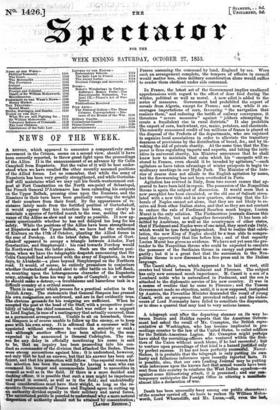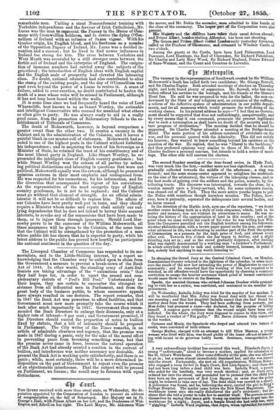Death has been unusually busy among our public character e:
of the number carried off, we have to reckon Sir William Mob a- worth, Lord Wham:Me, and Mr. Lucas,—all, even the last,
remarkable men. Uniting a stout Nonconformist training with Yorkshire independence and the fervour of Irish Catholicism, „Mr. Lucas was the man to represent the Papacy in the libuse of. !Com- mons with Cromwellian boldness, and to revive the dying O'Con- nellism of Ireland with an infusion of Saxon vigour. With his Quaker origin, his English blood,. an& his freshness as a member of the Opposition Papacy of Ireland, Mr. Lucas was a decided in- vention and a success; but he lived to find newer influences in Ireland too strong for him. The cross between Yorkshire and West Meath was overruled by a still stronger cross between the fertile soil of Ireland and the enterprise of England. The emigra- tion of immense numbers had carried away the subjects of the priesthood ; the introduction of English ideas with English capital and the English scale of prosperity had elevated the labouring class. No doubt, national education had also contributed to alter the stamp of the existing people, and the day of O'Connellism was past even beyond the power of a Lucas to revive it. A sense of failure, added to over-exertion, no doubt contributed to hasten the death of a man whose voice will be missed in Parliament, although it has not long been heard within the walls. It is some time since we had frequently heard the voice of Lord Wharncliffe, best known to us as Stuart Wortley, the estimable and intelligent Conservative who rescued for mankind what others so often give to party. He was always ready to aid in a really good cause, from the promotion of Reformatory Schools to the es- tablishment of Tribunals of Commerce.
The death of Molesworth, however, is beyond comparison a greater event than the other two. It creates a vacancy in the Cabinet and in the administration of the Colonies, and it leaves a painful blank inour muster-roll of statesmen. Molesworth had ac- ceded to one of the highest posts in the Cabinet without forfeiting his independence; and in acquiring the trust of his Sovereign as a Minister of State, he retained the trust of his constituency and of the most liberal party in England. Like Stuart Wortley, he re- presented the intelligent class of English country gentlemen; but while Stuart Wortley won the esteem of all parties- by soften- ing political distinctions and labouring in questions that were not political, llfolesworth equally won the esteem, although he presented • opinions extreme in their most emphatic and undisguised form. He was respected for his earnestness, for his information, and for the discretion that accompanied the vigour of his convictions. ..As the representative of the most energetic type of English .country gentlemen, he is not to be replaced ; and the Cabinet must go without that element of strength. As an official admin- istrator it will not be so difficult to replace him. The affairs of our Colonies have been pretty well put in train, and they chiefly require a Minister whose name and repute shall satisfy our out- lying dependencies that he does not intend to betray their assured
• interests, to revoke any of the concessions that have been made to them, or to injure them through ignorance. Should Lord Har- rowby prove to be the successor of Sir William Molesworth, all these assurances will be given to the Colonies, at the same time that the Cabinet will be strengthened by the promotion of a man whose public life has shown that he is superior to party, while his latest address to the public has proved how heartily he participates , the national sentiment in the question of the day.



























